Share
Working at ESO
Are you interested in working in areas of frontline technology and in a stimulating international environment? Do you feel your profile matches our requirements? Learn more about our current vacancies and apply online. Read more..
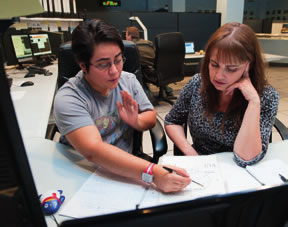
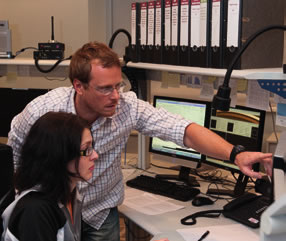

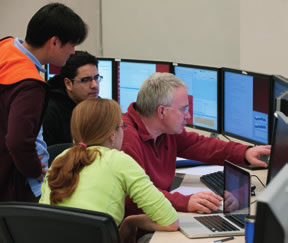
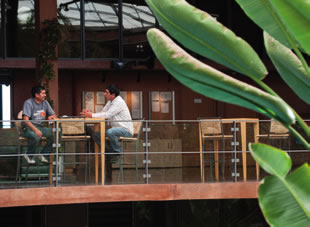
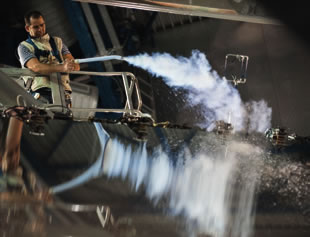
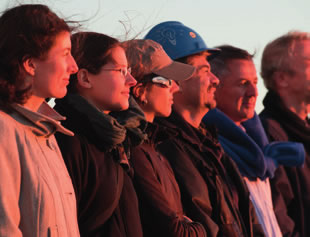
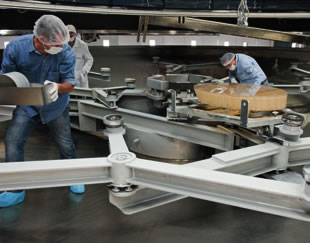
The European Organisation for Astronomical Research in the Southern Hemisphere (ESO) is the foremost intergovernmental astronomy organisation in Europe and the world's most productive ground-based astronomical observatory. ESO carries out an ambitious programme focused on the design, construction and operation of powerful ground-based observing facilities enabling astronomers to make important scientific discoveries.
ESO operates three unique world-class observing sites in northern Chile: La Silla, Paranal and Chajnantor (home to ALMA and APEX), and the ESO Headquarters are located in Garching, near Munich, Germany.
At Paranal, ESO operates the Very Large Telescope, the world's most advanced visible-light astronomical observatory, and will host and operate the southern array of the Cherenkov Telescope Array, the world's largest and most sensitive high energy gamma-ray observatory. ESO is a major partner in ALMA, the largest astronomical project in existence. And on Cerro Armazones, ESO is building the 39-metre Extremely Large Telescope (ELT), which will become "the world's biggest eye on the sky" and whose operations will be fully integrated into the Paranal Observatory.
The Project Science Department, within the Directorate for Science at its Headquarters in Garching, near Munich, Germany, ESO is advertising the position of
Astronomer / Project Scientist
Garching
Deadline 06/01/2022
ESO is engaged in the operation and construction of a number of state-of-the-art optical and infrared instruments for its observatories. The Instrument Project Scientist supports the development of science goals for new instruments, and monitors and nurtures those objectives during the full development, construction and commissioning phases. The Project Scientist thus ensures that the top-level requirements are fulfilled and that the operational scenarios are commensurate with the scientific needs and the constraints of the observatory. The development of the instruments may either be carried out by a consortium of universities and institutes, working in collaboration with ESO, or by an internal team at ESO. The Project Scientist is a prime contact for the associated consortia, as well as for the ESO scientific community at large when it comes to preparing for and advertising the science. The successful applicant will be assigned to follow one or more instruments at any given time .
We are looking for an enthusiastic and outstanding scientist, with the prime objective to support and follow the new generation multi-object optical and near-infrared spectrograph for the Very Large Telescope: MOONS. MOONS is a remarkable spectrograph, which will be positioned at one of the Nasmyth foci of the VLT, based on a fiber-positioner with superb multiplexing capabilities, and delivering thousands of low / high spectral resolution spectra. From surveys of nearby stars to remote high-redshift galaxies, MOONS will be a powerful machine to probe the physics of astronomical targets, and to reveal their formation and evolution histories, serving a broad range of science topics and a large community of scientists throughout the world. MOONS is in the final stages of its construction and integration life, with a potential sky commissioning at Paranal in 2024. We expect the successful candidate to acquire and/or develop unique competences and skills which will be further applied and developed beyond the early operations of MOONS for future ESO instrumentation projects. ESO encourages junior-career scientists to apply for this position.
Main Duties and Responsibilities:
- Provides strong scientific leadership to the assigned instrument programmes within ESO;
- Acts as the principle scientific contact to the instrument building consortium;
- Liaises with ESO's scientific community on issues related to the instruments under their responsibility;
- Develops, owns and maintains the scientific requirements for the assigned instruments;
- Works closely with the ESO Project Managers and System Engineers to ensure the implementation of the scientific requirements;
- Coordinates and connects with the relevant Programme Scientist(s) on the related instruments and projects;
- Supports the testing, commissioning and early operations. Specifically, preparation for the science operation during design, manufacturing/assembly/integration, testing and commissioning of the instrument in close cooperation with the observatory;
- Participates in progress meetings and instrument reviews;
- Tracks the evolving requirements for the assigned instruments emerging from the community;
- Interacts closely with the observatory and data management teams on operational aspects; and
- Coordinates the activities of the instrument Science Team.
As a member of the ESO Astronomy Faculty, the successful candidate will be expected and encouraged to conduct a strong personal research programme and to participate actively in the scientific life of ESO.
The tasks are not limited to the above and a flexible approach and willingness to adapt are required.
Reports to:
Head of the Project Science Department
Key Competences and Experience:
Essential:
- Active research programme and robust publication record;
- Expertise in optical and/or near-infrared spectroscopy;
- Understanding of the science requirements on instruments and strategies for their realisation;
- Experience with the planning, execution, analysis and publication of scientific research arising from said instrumentation;
- Ability to provide scientific and strategic vision and leadership to geographically dispersed multi-cultural/multi-disciplinary teams within a cost-constrained programme;
- Proficiency in relevant data reduction methods and tools;
- Ability to motivate and inspire others;
- Cooperative team player;
- Ability to work in a clear and structured manner producing meaningful reports to supervisors and presentations to governing bodies;
- Provides clear, concise and timely oral and written communication, identifying the key issues, examining options, and proposing a way forward;
- Ability to effectively communicate at all levels and across disciplines within the organisation and with the community; and
- Ability to negotiate with external scientists and instrument builders to achieve ESO's goals.
Desirable:
- Experience and involvement in the key phases of the development of an astronomical instrumentation project (initial/final design, system testing, or commissioning and early operations).
Qualifications:
Essential educational level:
- PhD in Astronomy, Physics or equivalent
Qualifications which would be an asset:
- Expertise in multi-object spectroscopy; and
- Expertise in fiber-fed astronomical instrumentation.
Language skills:
Excellent command of the English language (written and oral) is essential.
Remuneration and Contract:
We offer an attractive remuneration package including a competitive salary (tax free), pension scheme and medical, educational and other social benefits, as well as financial help in relocating your family and the possibility to place your child/children in daycare.
ESO aims to support members of personnel in maintaining a good work-life balance (https://www.eso.org/public/jobs/conditions/intstaff/#work-life-balance) between their professional and private life. ESO is also committed to offering family-friendly support (https://www.eso.org/public/jobs/conditions/intstaff/#family-friendly-support), creating a work environment and policies which allow staff to balance their professional and private responsibilities through flexible working arrangements and financial support for families.
The contract is for a fixed term duration of three years and is subject to successful completion of the probation period. There is the possibility of one extension of contract up to a further three years, subject to individual performance and organisational requirements, and as defined in the applicable policies and staff rules and regulations, which are under review. For any further information, please visit ESO's conditions of employment (https://www.eso.org/public/jobs/conditions/).
Duty Station:
Garching near Munich, Germany with regular duty trips to all ESO sites in Chile.
Career Path:
V (Research, development or complex professional work).
Application:
If you are interested in working in areas of frontline science and technology and in a stimulating international environment, please visit http://www.eso.org for further details.
Applicants are invited to apply online at https://recruitment.eso.org/. Applications must be completed in English and should include a motivation letter, and a CV containing a publication list and a research statement. Also required are the names and contact details of three scientists familiar with your work and willing to provide a recommendation letter. Referees will be automatically invited to submit a recommendation letter. However, applicants are strongly advised to trigger these invitations (using the web application form) well in advance of the application deadline.
Closing date for applications is 6 January 2022.
Interviews are expected to start soon after this date.
ESO has established diversity as an important value of the Organisation, is committed to providing an equal opportunities environment and is actively seeking to promote a diverse and inclusive workforce.
No nationality is in principle excluded, however, recruitment preference will be given to nationals of Australia, Austria, Belgium, the Czech Republic, Denmark, Finland, France, Germany, Ireland, Italy, the Netherlands, Poland, Portugal, Spain, Sweden, Switzerland, the United Kingdom and Chile irrespective of gender, age, disability, sexual orientation, ethnicity or religion.
